- Home
- Steven Becker
Backwater Key Page 2
Backwater Key Read online
Page 2
Several boats racing toward me brought my focus back to the water. I looked around the bay, seeing almost twice as much traffic as I’d have expected. During the week, the park was generally quiet, but on weekends, the massive parking lots of Black Point and Bayfront Parks were filled to capacity. This was prime time—past the winter winds but before the summer heat and daily thunderstorms. It almost looked like some of the ski lakes in Northern California.
I dodged several more boats and stayed wide of the direct route to Adams Key and Caesar Creek. Having creek in the name was a misnomer for the channel running between the bay and the Atlantic. Tides and currents affected the well-traveled inlet, making it tricky to navigate. Being the closest to the two major boat ramps, it was a high-traffic area, and I wanted nothing to do with the boatloads full of coeds and partiers heading back to the mainland.
It was when I made the turn back to Adams Key, which lay on the bay side of Caesar Creek, that I saw the crab boat running north. The park was off-limits to traps, and this was a strange enough sight that I took notice. There was no good reason and more than a few bad ones for the boat to be transiting the bay. Dark smoke poured from the exhaust on the transom of the boat, telling me she was running near or at her top speed. I changed my heading to run parallel to the boat, but stayed far enough away so as to not cause them to change course.
Following a boat on the water is different from following a vehicle. Except for the area adjacent to the few marked channels, the entire bay was navigable. Unless both boats are clearly headed for the same point, such as an inlet or marina, there is no reason to follow someone. It’s better to stay as far back as possible and still keep the boat in sight. This was my plan as I headed back to the center of the bay, allowing the crab boat the shoreline. We passed the long concrete dock at Adams Key and I thought about just going home, but a crab boat running the bay late on a Sunday afternoon was uncommon.
I just wasn’t sure it was unusual enough to pursue. First, it was my day off, and second, I still had that smile on my face from a nearly perfect day. But there is something in my DNA that takes some of these decisions out of my control. I passed my home on Adams Key and started up the miles-long mangrove-covered coast of Elliot Key, making a deal with myself that if the boat continued past Stiltsville, the water-bound group of buildings at the northern end of the park that I would turn back. The structures now reduced to seven after the last hurricane, were one of the few things that Martinez and I both agreed on. They were bad for his budget and a refuge for nefarious activity.
The crab boat and I were forced closer together about halfway up Elliot Key. Toward its northern end was a long no-motor zone, and to the west lay the Featherbed Banks, a large shoal ridden area that was best avoided. Because of the natural funnel, I backed off on the throttle, allowing the crabber to slip ahead. Without a light bar, and with the park service insignia below the bow flare, I doubted they had even noticed the nondescript boat. The green fabric on the T-top was the only identifying feature, and would be invisible from this distance.
The crabber continued unabated, blowing its wake into the mangroves. Sands Key lay just ahead and Boca Chita, the last and most northern key in the miles long chain of barrier islands, lay on the other side of Lewis Cut. He increased speed, and my smile faded when I saw the silt trail behind the boat as its propeller scarred the bottom of the turtle grass-covered bottom. This was a delicate ecosystem, which supported fish and crabs; one that took years to replace.
Even though my boat didn’t draw as much water as the larger, heavier crabber, I hit the small button on the throttle to raise the tilt of the engine and followed. The trail darkened as the Crabber’s propeller tore through the bottom. I didn’t need to worry about keeping the boat in sight with the stream of muck trailing behind it.
Finally, they reached Sands Cut and found the deep-water channel. I was about to turn back when they turned into the pass, but then I wondered what reason they had for staying inside the barrier islands at all and risking the ire of the rangers and FWC officers for tearing up the seagrass bottom. I was still short of Boca Chita Key and decided to keep following them. The worst that would happen was that I would take the outside route back home.
Entering Sands Cut I accelerated to offset the effect of the current and saw the crabber ahead turn north after the last marker. When he stopped and dropped anchor just offshore of Boca Chita, I knew something was wrong.
Boca Chita Key, with its iconic lighthouse and campground, was generally well-visited, and today was no different. The small island also had the advantage of a protected harbor and an actual beach, something rare for the park. A park service boat cruising these waters would be a normal sight, and nothing to alarm the crabber. That gave me the confidence to move closer. They were technically doing nothing wrong, except whatever had brought them to these waters was still a mystery to me.
The only thing that might look out of place with a close pass was that I was out of uniform, and that was something that would put a suspicious captain on guard. Taking the chance that they were here for a reason, I decided to use my shorts and T-shirt to my advantage and have a look from land. Staying to the deeper water, I worked north around the point of the small island and with the lighthouse on my port side, turned into the harbor.
A long concrete seawall encased the cove and I had to take a minute to drop my fenders before approaching. I slid into a space between several larger boats, tied off the boat, and hopped onto the path running alongside the harbor. The beach where I could observe the crabber was directly across the island, and I took off at a fast walk through the mostly full campground. The spring and fall were the best seasons to camp here; the heat was tolerable, and the mosquito count lower than during the summer months.
Trying to avoid invading on occupied sites, I serpentined my way to the beach and looked out over the calm Atlantic. The crabber was anchored in about ten feet of water, less than a hundred yards off the beach. There were at least eight men aboard; more than would normally crew a boat of this size, and they didn’t look like fishermen. I pulled out my camera and with the zoom on its maximum setting, took several pictures, hoping the computer screen would reveal the origin of the tattoo that seemed common to each man.
3
Besides the similar tattoos, there was something about them that said gang. Maybe it was the uniform look and dress, or the camaraderie. They weren’t wearing colors—mostly black tank tops and jeans, which still looked out of place here—but there was enough ink on the men to have furnished several tattoo shop owners a healthy retirement.
I stayed and watched as the shadows grew longer, and the men became drunker and louder. Empty bottles were tossed in the water and a fight broke out near the stern. After that things settled down for a few minutes—before I heard the first shotgun fire. Several more blasts followed and I was surprised to see flames and sparks shooting form the muzzles of the some of the guns. Fortunately they were shooting toward the open water and not the island, so no one in the gathering crowd was in danger.
Then something went in the water, followed by two men who dove in to retrieve it. The display of firepower ended and the weight of the men as they leaned over the gunwale watching was enough for the boat to list heavily toward that side. The crabber was built to carry stacks of heavy crab traps and I had no fear that it would sink. Just as the sun set the two men climbed back aboard empty-handed. The sounds of the argument that followed was obscured when the engine started with a belch of black smoke. I watched as they pulled anchor and headed back toward Sand Key. I called the disturbance in to Miami-Dade in case they continued and I needed backup, and decided to shadow them. Only a foolish man would try to board a boat full of drunken gangbangers, especially alone, and I doubted Miami-Dade would reach the area before the crew disappeared into one of the myriad creeks and channels in the southern part of the park. I wasn’t surprised when the dispatcher said they would be standing by in case there was trouble, but they h
ad no interest in a reconnaissance trip. Our jurisdictions were separated by dotted lines on a map and our cases often overlapped. That didn’t mean either agency liked that.
As I followed them past Adams Key, I tried to theorize why they had been there. Ignoring coincidences was bad for business—and the government shutdown, still scheduled for midnight—and what looked like a show of strength from a gang was definitely not something to be ignored. I followed until the boat turned into the channel and headed out Caesar Creek. After the crabber slowly moved offshore and to the south, I decided they weren’t my problem anymore—at least not today
Just as I reached the dock, my neighbors Becky and Ray’s pit bull mix Zero came barreling down the concrete walkway. His toenails skidded to a stop by the bow and he looked at me, and then the rest of the boat. Giving a short bark to express his dissatisfaction that I was alone, he backed away and collapsed onto the warm dock. I called out to him and his stubby tail wagged, but I could tell he was disappointed. I hardly ignored him, but Allie and Justine paid him the attention he believed he was entitled to.
“Where’s your girls at?” Becky asked as she came toward the boat.
“Allie has school tomorrow and Justine drove her to meet her mom.”
“If I was you, I’d be watching that business of them women together. Careful there,” she said.
Becky and Ray, along with their three-year-old, Jamie, and Zero lived in the other house on Adams Key. With its large well-manicured clearing, the small island was unusual for this area. It was a rare to find open land on these mosquito-infested, mangrove-covered islands. Adams and some of the adjacent keys were labeled on some charts as Islandia. It was a romantic-sounding name for a swamp that had been given to the area by a group of developers in the 1920s. Originally called Cocolobo Key, what is now Adams once hosted the Cocolobo Cay Club, a famous resort that claimed to have hosted four presidents. After the club fell into decay, the eye of hurricane Andrew finished off whatever was left of it and its surrounding buildings. All that remained now was the clearing, with our two park service houses and a small day use area accessed by the long concrete dock.
You didn’t have to look very hard to see signs on most of the barrier islands showing different developers’ attempts over the years to carve out a slice of paradise. Deep-water, dead-end canals were common signs left over from the period before the government had put a stop to dredging. Over time, most of the land-based attempts to tame the islands had been retaken by nature.
“What’s Ray going to do about the shutdown?” I asked. My neighbor Ray maintained Adams Key as well as the campgrounds and facilities on the other out islands. He had the unique ability to fight off the salt, sun, bugs, and brush to keep everything working on the islands, but he was a rough guy, the kind that the bureaucrats had a hard time living with. But even Martinez, for all his complaining, knew that it would be harder to live without him than with him.
“Fish a bit more, but I know the old coot. He won’t let his territory fall too far.”
“Yeah, Martinez has called a staff meeting for tomorrow morning.” I figured I should tell her because Ray was likely to blow it off.
“Y’all should go just to watch him squirm,” she laughed. “I would if I could.”
“Tell Ray I’ll ride over with him. Probably ought to hoard some of the government gas before we have to start buying our own.”
“Right about that. Y’all want to watch the dog for a bit. Jamie’s been sick and I could use some sleep.”
“Sure thing. Tell Ray I’m leaving at eight.” This was pretty much standard procedure at least twice a week. When Justine stayed over, she would volunteer, but I always accepted the company. Zero could be a pain, though. He was the island’s alarm, notifying the occupants whenever a boat was near the dock. My house was set back farther than Ray and Becky’s, making it less of an issue for me, but even though the dock was clearly marked as a Day Use Area, we still had some nighttime visitors.
I called for the dog to follow and after hosing down the boat, started toward my house. The euphoria I had felt earlier had been replaced by dread at what the shutdown would do to the park. I had been through this once already, out west in 2013 when we had lost funding for almost two weeks. There was some good that might come out of it. Without Martinez dictating my schedule or Susan McLeash waiting in ambush for me to misstep, there would be no patrol schedule and I could pick my fishing spots.
I had learned that fishing was a great way to do my job, though it often landed me in trouble. Back in the Plumas Forest, I had been fly fishing one of the streams when I noticed a current running the wrong way through an eddy. Without a rod in my hand, I never would have found the irrigation inlet that led me to uncover the pot grow that had changed my life. Here in Biscayne, I had already found a handful of bodies while fishing the backwaters.
Those events would not deter me. When I had a fishing rod in hand, I felt at one with my surroundings, and noticed things I would not normally see. Chico, one of the local guides that I had befriended, gave me pointers on some of the out of the way spots that had paid off both in fish and trouble. “Out of the way” was a misnomer here—the miles of mangrove shoreline and winding channels, some manmade but most natural, gave people not wanting to be found the perfect opportunity. And all in sight of the Miami skyline.
What had been a perfect day ended in an uneasy night. Rather than reliving the memories of diving with Allie, the crab boat was on my mind. With the exception of the cartel, we hadn’t had much in the way of gangs in the Plumas Forest. Motorcycle clubs were more common and the nearby foothill towns were often overrun with rides. Most were clubs out for a day of riding; others were up to no good.
Unable to sleep, I got up early. After turning on the coffee pot, I opened my laptop and downloaded the pictures I had taken yesterday. Despite maxing out the zoom, several were clear enough to make out the tattoos. Google took less than two seconds to identify the men as Outlaws. California was still Hells Angels territory; the rest of the country belonged to the Outlaws. On a hunch, I scanned the faces against the FBI’s ten most wanted list, and shut down the computer knowing at least none of the men I had seen were on it.
Tendrils of daylight filtering in through the blinds told me the time, and with two hours until Martinez’s meeting I needed something to do. Justine was an accomplished standup paddleboard racer, and after trying to keep up with her in a kayak I had found on the island, I had finally bought a board of my own. After changing into board shorts and a dryfit top, I grabbed the board and paddle from the side of the house and carried them to the dock. It was low tide, making the drop to the water close to five feet, but I had devised a system for launching the board. With a dock line attached to the leash plug, I slid the board off the dock and, using the line, brought it to the ladder.
Caesar Creek is known for its strong current and this was the case this morning. With the tide flooding in the pass, I had to drop to my knees and steer directly into it in order to cross the channel and reach the protection of the islands across the way. From there the water flattened out as the current dissipated into the large bay and I was able to stand. For an hour, I worked my way through the small islands that surrounded Jones Lagoon. I was feeling pretty confident and exited on the ocean side in order to ride the current back to Adams Key. On my first attempt, I blew past the dock, but was able to back-paddle and grab the last piling. Zero, of course, not recognizing me on the board, hovered overhead, barking at me.
After a shower and breakfast, I met Ray on the dock and we headed to the boat. “You still ride?” I asked, remembering something he had said about missing motorcycles out here.
“Used to back home. Been boat bound for a while now and that prick of a boss won’t let me store one at headquarters.”
“Know anything about the gangs here?”
“The Outlaws are always making the news for one thing or another, but I ain’t looking for trouble.”
“I h
ear you,” I said, and released the lines to Ray’s boat. I was still a novice in his eyes and he preferred to drive. I was a quiet guy, but Ray made me look like a talker, and it was easy for both of us to settle into the rhythm of the seas as the boat cruised west. The crabber and bikers were soon forgotten and I thought of better things: Allie and Justine—until I saw the black smoke on the horizon.
“What do you figure that is?” I leaned into Ray so he could hear me and pointed to the streaming smoke to the north.
“Ain’t no wind. Looks to be from Boca Chita.”
The chimneys across the water at the Turkey Point Power Plant confirmed this as the smoke gently wafted from them. If there were any breeze they were a sure indicator of its strength and direction.
“Might want to check it out. Could be a fire,” I said.
“Hell yeah. Any excuse not to have to listen to that sorry ass boss is good with me,” he said, cutting the wheel to port. He drove harder and faster than I dared and a few minutes later, the lighthouse soon came into view and we slowed. He made a wide turn to hit the channel leading to the harbor.
The black cloud was dissipating quickly and I thought we might have wasted the trip as well as the soon-to-be-precious fuel when suddenly, a loud roar came from the harbor. I grabbed the stainless steel support for the T-top as a banana yellow go-fast boat sped from the harbor.
4
There was nothing we could do but watch the wake dissipate as the go-fast boat blew through the no-wake zone. Our park service bay boats were practical craft for these waters, but no match for twin three-hundred-horsepower engines. I grabbed the helm for support as the wake passed underneath the boat, throwing me off-balance and making it impossible to focus the binoculars. I strained for a glimpse of the men at the helm. Wearing cut-off denim jackets and skull caps, the two men disappeared from view before I could make out any other distinguishing features. The banana yellow hull stuck out but was not unusual enough in itself to locate the boat later; there were probably hundreds like it in the surrounding marinas.

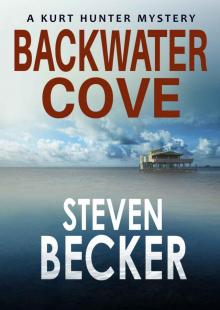 Backwater Cove
Backwater Cove Storm Surge: A Fast Paced International Adventure Thriller (Storm Thriller Series Book 3)
Storm Surge: A Fast Paced International Adventure Thriller (Storm Thriller Series Book 3)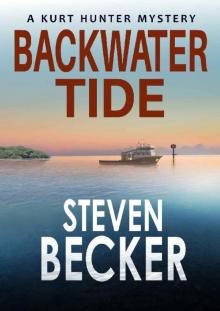 Backwater Tide
Backwater Tide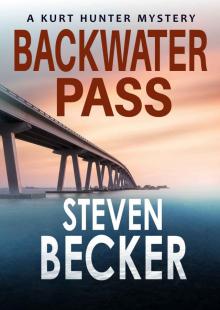 Backwater Pass
Backwater Pass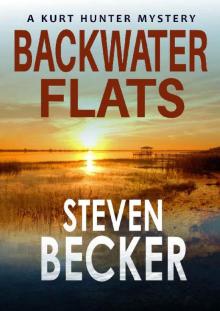 Backwater Flats
Backwater Flats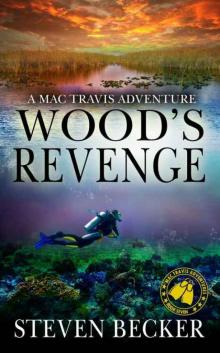 Wood's Revenge
Wood's Revenge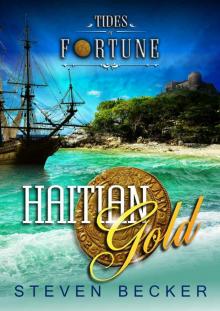 Haitian Gold
Haitian Gold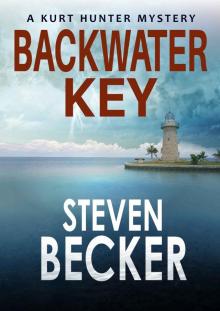 Backwater Key
Backwater Key Wood's Tempest
Wood's Tempest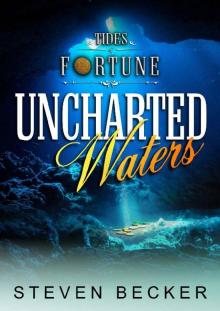 Uncharted Waters
Uncharted Waters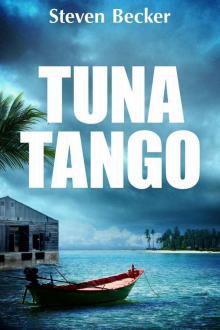 Tuna Tango
Tuna Tango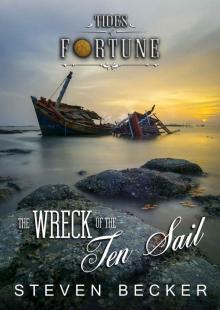 The Wreck of the Ten Sail
The Wreck of the Ten Sail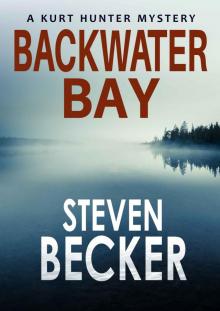 Backwater Bay (Kurt Hunter Mysteries Book 1)
Backwater Bay (Kurt Hunter Mysteries Book 1) Storm Clouds
Storm Clouds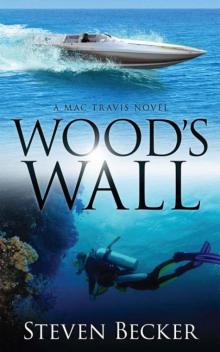 Wood's Wall
Wood's Wall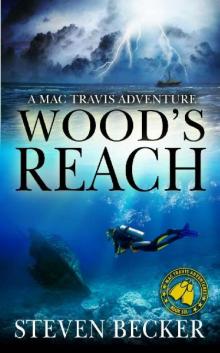 Wood's Reach
Wood's Reach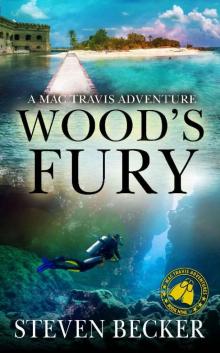 Wood's Fury
Wood's Fury Storm Rising
Storm Rising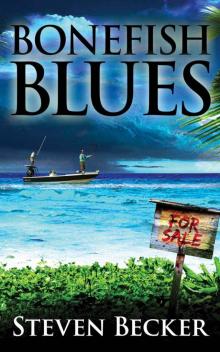 Bonefish Blues
Bonefish Blues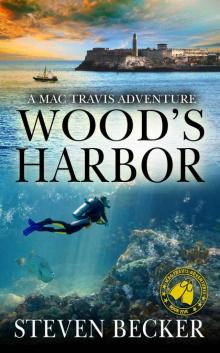 Wood's Harbor: Action & Sea Adventure in the Florida Keys (Mac Travis Adventures Book 5)
Wood's Harbor: Action & Sea Adventure in the Florida Keys (Mac Travis Adventures Book 5)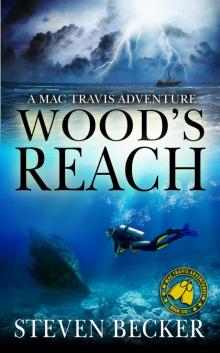 Wood's Reach: Action & Sea Adventure in the Florida Keys (Mac Travis Adventures Book 6)
Wood's Reach: Action & Sea Adventure in the Florida Keys (Mac Travis Adventures Book 6)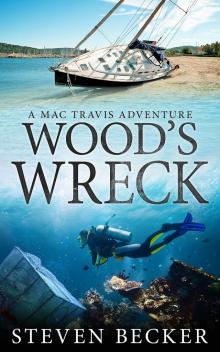 Wood's Wreck
Wood's Wreck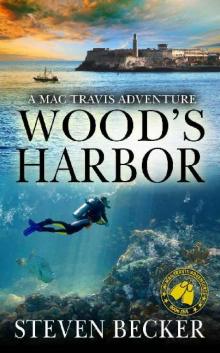 Wood's Harbor
Wood's Harbor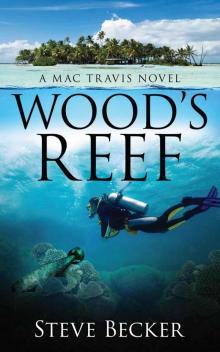 Wood's Reef
Wood's Reef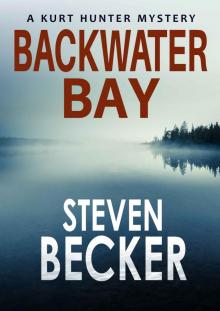 Backwater Bay
Backwater Bay